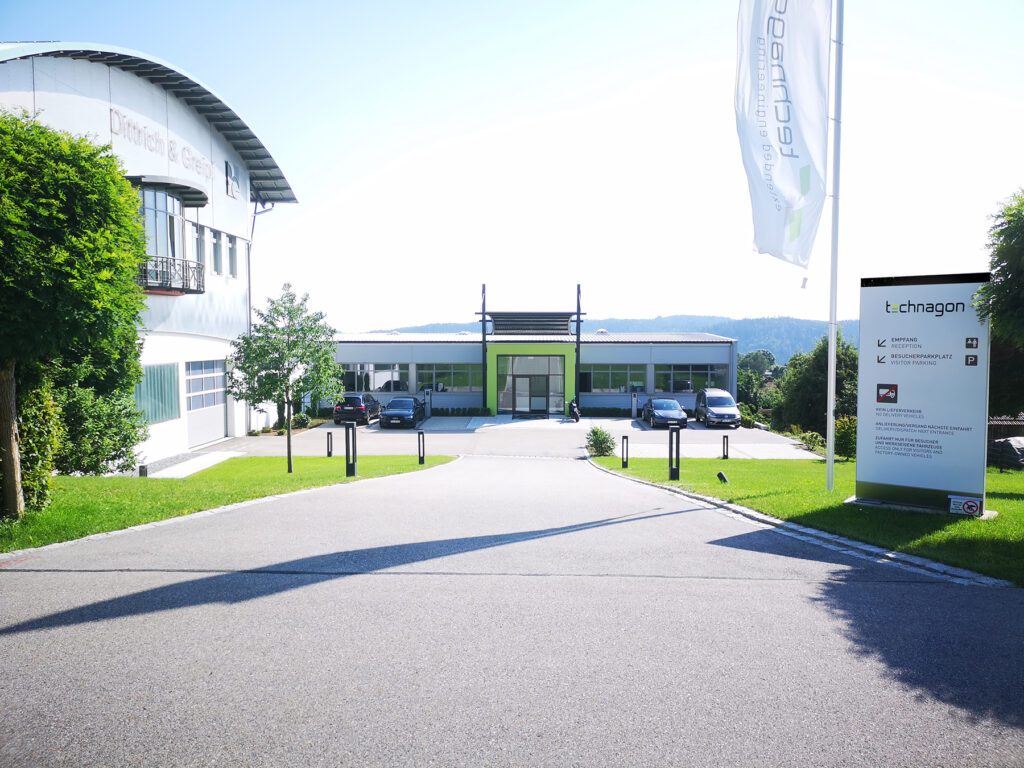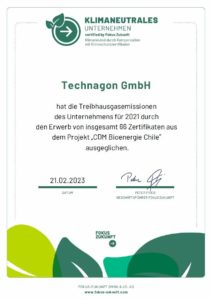Support for international climate protection projects
Climate-neutral* company - certified by Fokus Zukunft
Technagon is aware of our shared responsibility for our environment. That is why we want to achieve climate neutrality on our own in the mid term. To offset our CO² emissions in the short term, Technagon is investing in the purchase of climate certificates. We support the “CDM Bioenergy Chile” project via the Fokus-Zukunft initiative.
CDM Biomass Chile” project description
The project activity consists of expanding the electricity generation capacity of the Horcones biomass power plant, which is located in the Horcones complex. Investments are being made in the installation of a new combined heat and power plant. The project activity aims to use biomass from industry (sawdust and bark from sawmills) and biomass from forestry (from harvesting, thinning and pruning operations) to generate electricity. Without the project activity, this biomass would be burned uncontrolled in the open air or left to decay naturally in piles. By earning a total of 66 certificates from this project, Technagon is climate neutral*.
Climate change is the greatest challenge facing humanity since the end of the ice age and is the defining issue of our time. The consequences of global warming are becoming ever more noticeable and the pressure on politicians and companies is increasing – not least due to the Fridays for Future movement. There is now a global understanding that we urgently need to work against man-made climate change.
The success of emission reductions depends very much on the willingness of businesses in industrialized countries to act voluntarily and consistently. We at Technagon GmbH are also prepared to take responsibility for the world that we are leaving to our children and grandchildren.
For this reason, we have had the greenhouse gas emissions caused by our company’s activities recorded and have compensated for them by purchasing a total of 66 climate protection certificates for 2021. We are supporting a bioenergy project in Chile that has been certified by the Clean Development Mechanism with these certificates.
We are aware of our special responsibility as a company towards future generations and have acted accordingly. Fokus Zukunft GmbH & Co. KG has determined for us: Our CO2 footprint is approximately 66 tons of CO2-equivalent pollutants per year. To illustrate this: on average, a person in Germany produces around 10.8 tons of CO2 per year through their lifestyle.
Greenhouse gases are distributed evenly in the atmosphere. It therefore makes sense to avoid emissions where the costs are lowest. In addition, projects in emerging and developing countries contribute to improving the economic, social and ecological situation and support the realization of the United Nations’ sustainability goals. For emerging and developing countries, emissions trading is a key driver for the transfer of clean technologies and sustainable economic development.
This greenhouse gas balance sheet provides a transparent overview of our company’s greenhouse gas emissions. The report is therefore an important step in our commitment to climate protection. Based on the values determined and through the purchase of a corresponding quantity of climate certificates, our company has been made climate-neutral. We have received the “climate-neutral company” award for offsetting our greenhouse gases.
The global community has agreed that global warming must be limited to below 2 degrees Celsius – or even better to 1.5 degrees – in order to prevent catastrophic consequences. However, the current pledges made by individual countries are only sufficient to limit global warming to a maximum of 4 degrees. Closing this ambition gap will require additional and substantial commitment from businesses and citizens. We have recognized that voluntary emission reductions and the offsetting of unavoidable emissions are essential in order to effectively counteract climate change. That is why we have decided to neutralize our CO2 emissions and thus want to make a contribution to a future worth living. Because we don’t just want to analyze the problems, we also want to do something about them and solve them.
The carbon footprint is the measurement of the amount of greenhouse gases (measured in CO₂ equivalents) produced directly and indirectly by an activity of an individual, a company, an organization or a product. It includes the resulting emissions from raw materials, production, transportation, trade, use, recycling and disposal. The basic idea of the CO2 footprint or carbon footprint is therefore to create a basis on which influences on the climate can be measured, evaluated and compared. This makes it possible to identify necessary reduction potentials, develop measures and evaluate their effectiveness. The corporate carbon footprint is the CO2 footprint of a company and the product carbon footprint is the CO2 footprint of a product.
According to the principle of the “Clean Development Mechanism” described in the Kyoto Protocol, greenhouse gases that are produced in one place on earth and cannot be avoided are to be saved by climate protection projects in another place. To finance this, companies buy certificates for corresponding climate protection projects from the six available project sectors (biomass, cooking stoves, solar energy, forest protection, hydropower and wind energy). Each certificate represents 1 ton of CO2 saved by the respective project. There are numerous climate protection projects around the world, most of which support renewable energy projects. The initiators of these projects receive emission credits for their commitment, which can be traded in the form of climate protection certificates. The amount is measured, for example, by comparing it with the emissions that would have resulted from the construction of a coal-fired power plant.
We commissioned the external sustainability consultancy Fokus Zukunft to calculate our company’s footprint. The carbon footprint was calculated using the official guidelines of the Greenhouse Gas Protocol.
Within the Greenhouse Gas Protocol, emissions are divided into Scopes 1, 2 and 3, each of which comprises different types of greenhouse gas emissions. Scope 1 includes direct emissions from our own energy plants. Scope 2 covers emissions generated indirectly by Fokus Zukunft GmbH & Co. KG, Leutstettener Straße 28, 82319 Starnberg 3 provision of energy for the company. Scope 3 emissions are further indirect emissions that arise along the entire value chain.
The seven main greenhouse gases defined by the IPCC and the Kyoto Protocol – carbon dioxide (CO2), methane (CH4), nitrous oxide (N2O), hydrofluorocarbons (HFCs), perfluorocarbons (PFCs), nitrogen trifluoride (NF3) and sulphur hexafluoride (SF6) – are included in the calculation of greenhouse gas emissions.
Not all of the seven main greenhouse gases are equally effective. Methane, for example, is 25 times more harmful to the climate than CO2, nitrous oxide 310 times and sulphur hexafluoride as much as 14,000 times. In order to compare emissions with each other, all greenhouse gases are therefore converted to CO2. They are then referred to as CO2 equivalents.
The conversion of the consumption data collected (such as electricity consumption or fuel consumption) is carried out using emission factors that indicate the emissions per unit (e.g. per kilowatt hour of electricity or liter of petrol). The emission factors come mainly from DEFRA (Department for Environment, Food and Rural Affairs), but also from the GEMIS database (Global Emissions Model of Integrated Systems, IINAS) and the Ecoinvent database and are updated regularly.
The initiators of the climate protection projects – predominantly renewable energy projects – receive emission credits for their commitment, which can be traded in the form of climate protection certificates. The amount of emission compensation is determined, for example, by comparing it with the emissions that would have resulted from the construction of a coal-fired power plant instead of the generation of renewable electricity.
The climate protection projects we purchase are each accredited, approved and monitored in accordance with one of the three internationally recognized certification standards – VCS (Verified Carbon Standard), CDM (Clean Development Mechanism) or the Gold Standard developed by WWF. The validation of the project results in terms of the CO2 savings achieved is certified by independent testing bodies such as TÜV.
The acquired number of CO2 certificates were decommissioned. This is significant as this retirement is a prerequisite for the design and marketing of carbon-neutral companies and/or products. Without decommissioning, a CO2 certificate could continue to be traded on the voluntary market, which would not achieve any additional reduction in emissions.
With a total of 66 certificates, we are supporting a biomass project in Chile that has been certified by the Clean Development Mechanism. You can find a detailed description of the project at: https://www.fokus-zukunft.com/en/emission-reduction-projects/
Climate change is global, so it doesn’t matter where CO2 emissions are produced or saved, in the end it is the total amount of greenhouse gases that matters. In Germany, reducing or offsetting CO2 is very expensive, whereas in emerging and developing countries, offsetting is cheaper. The Kyoto Protocol, which is binding under international law, therefore stipulates that so-called climate protection projects that avoid or store greenhouse gas emissions should take place where they are most economical.
Accordingly, there are many projects in emerging and developing countries, as the potential for savings through new technologies is still very high here and they can be used much more cost-effectively. In addition, the conditions for renewable energy systems (solar, wind, water and biomass) are often much more favorable there. Furthermore, the projects in emerging and developing countries contribute to improving the economic, social and ecological situation and support the realization of the United Nations’ sustainability goals. For emerging and developing countries, emissions trading is a key driver for the transfer of clean technologies and sustainable economic development.
What are the benefits of climate neutrality for our company?
1. contribution to the goals of the government, the European Union and the United Nations Sustainable Development Goals (SDG).
2. raising awareness among employees, suppliers and customers regarding the use of finite resources. This has a positive impact on the use of energy and other resources in the company and in people’s everyday lives.
3. entry into the growth market of “sustainable companies”. Our “climate-neutral” status allows us to distinguish ourselves in our market segment.
4. this currently enables us to play a pioneering role, positioning our company as progressive, innovative, cooperative and forward-looking.
5. promotes awareness of the energy transition.
6. through its status as a climate-neutral company and the range of products and services it offers, the company becomes a partner to its customers in the above-mentioned areas.
*by offsetting with climate protection certificates


